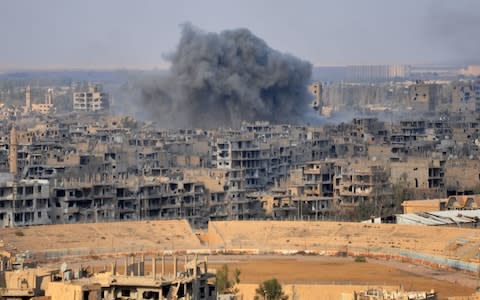Isil facing endgame after fall of last city in its caliphate

Islamic State is facing its endgame after Syrian troops retook its last-remaining city and Iraqi forces closed in on its final pocket of territory along the border.
The loss prompted Britain to announce it would soon begin withdrawing its jets from the coalition air effort against Isil, drawing down a three-year offensive against the terror group as its "caliphate" crumbles.
The simultaneous assaults on Deir Ezzor in eastern Syria and Al-Qaim in western Iraq leave Abu Kamal, on the Syrian side of the border, the last town of note under its full control.
The battle for Deir Ezzor, led by the Syrian government and allied militias with Russian air support, saw two months of heavy fighting, but the city fell relatively quickly compared to Isil’s capital Raqqa and Mosul in northern Iraq.

Isil jihadists seized Deir Ezzor province in 2014, including vital oil and gas fields that served as a key source of revenue for the extremists. The jihadists were making millions of pounds a month from the sale of crude pumped from the two main oil fields.
It had also been strategically important as a corridor to transfer fighters, arms and goods between Iraq and Syria.
As Raqqa came under intense pressure, many of Isil’s senior and foreign fighters moved to Deir Ezzor, which became its new operational and financial hub.
While Isil has been driven from most of its strongholds in Deir Ezzor, it still controls over 35 percent of the province, much of it empty desert.
At the height of its power the group controlled a third of Syria and a third of neighbouring Iraq, making up a quasi-state the size of Britain. The coalition announced last week it has lost 90 per cent of its caliphate.
In Iraq, troops reached the border on Friday morning and continued to close in on the last remaining pocket of militant-held territory in Anbar province.
Desperate militants were seen crossing from the Iraqi side to Abu Kamal in Syria, according to opposition media.
Haider al-Abadi, Iraq’s prime minister, pledged the battle will be finished within days and would declare Iraq completely clear of Islamic State.

The jihadists are now confined to a small stretch of harsh desert land either side of the Syria-Iraq frontier.
Omar Abu Layla, executive director of news outlet DeirEzzor24, said he thought as many as 4,000 fighters could still be around Abu Kamal, who could still mount insurgent attacks.
“Isil gave up Deir Ezzor without much of a fight. This was a strategy,” he told the Telegraph. “They have returned to fighting in the desert. They know [President Bashar] Assad doesn't have anywhere near enough forces to take and hold the 120km (75 miles) from Deir Ezzor to the border. What we will see in Abu Kamal is a battle like Raqqa."

Air Cdre Johnny Stringer, who leads Britain’s contribution to the air war against Isil, said the UK could begin withdrawing RAF jets from the US-led coalition’s campaign as early next year.
“I think we will still need an element of manned fast jet strike as well," Air Cdre Stringer told reporters on Friday. "But I am hoping that we may see the ability to draw down elements of that final bit because frankly the tempo of our operations is going to reduce as Daesh are beaten in Iraq and in Syria."
He said Isil’s caliphate had “all but disappeared” but warned it was now likely to morph into an insurgent organisation.
Colin P. Clarke, a terrorism expert at the RAND Corporation, said Isil "is being forced to change its strategy and tactics, but it has been proactively preparing for the next phase of the conflict".
The world is watching it shift from being "an insurgency with fixed headquarters to a clandestine terrorist network dispersed throughout the region and the globe", he said.
Experts say as Isil will continue to grow abroad and may even look to link with other extremist groups in the region for strength.
“Look for more coordination between Isil and al-Qaeda outside and inside Syria and Iraq, despite their ongoing friction in other areas such as Yemen,” said Maha Hosain Aziz, who specialises in political risk, prediction and strategy as a professor at New York University.
“Isil will also continue to expand its recruitment pool worldwide to prepare for its long-term goal of forming a global Islamic caliphate.”

